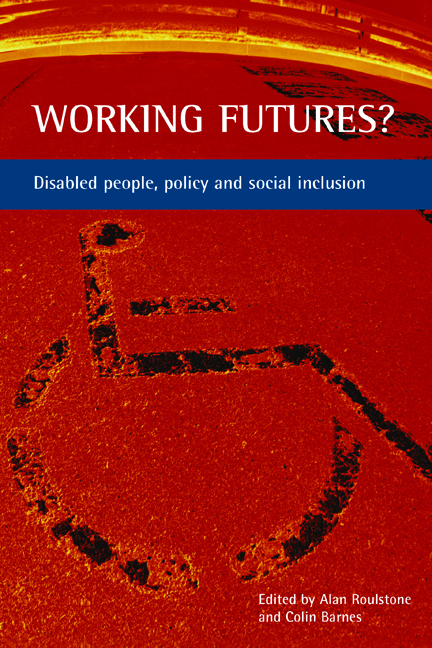Book contents
- Frontmatter
- Contents
- List of figures, tables and boxes
- Preface
- Acknowledgements
- List of abbreviations
- Notes on contributors
- Introduction Working futures: disabled people, employment policy and social inclusion
- Part One Work, welfare and social inclusion: challenges, concepts and questions
- Part Two The current policy environment
- Part Three Towards inclusive policy futures
- Index
- Also available from The Policy Press
twenty - Professional barriers and facilitators: policy issues for an enabling salariat
Published online by Cambridge University Press: 18 January 2022
- Frontmatter
- Contents
- List of figures, tables and boxes
- Preface
- Acknowledgements
- List of abbreviations
- Notes on contributors
- Introduction Working futures: disabled people, employment policy and social inclusion
- Part One Work, welfare and social inclusion: challenges, concepts and questions
- Part Two The current policy environment
- Part Three Towards inclusive policy futures
- Index
- Also available from The Policy Press
Summary
Introduction
Using social work as a case study, this chapter explores the barriers and facilitators that operate within a number of human services professions in relation to disabled people's access to those occupational groups. In particular, we are interested in examining how the current legislative context in the UK relates to the tendency to define the skills and knowledge of those entering professions through competence standards. Do these provide a means of greater or fairer access to disabled people or do they constitute an additional barrier?
Disabled people working in professions
There is a distinct lack of a comprehensive analysis in relation to disabled workers in the UK (Jones et al, 2003). It is unsurprising, therefore, that limited data is available in relation to disabled people working specifically in a professional capacity. That which is available, raises difficulties in relation to definitions of disability used to collect data (Smith and Twomey, 2002). Thus, not only is there inconsistency in how data is collated, the potential usefulness of the data is also somewhat limited. Some agency-led studies utilise self-reported disability statistics focusing on specific roles within an organisation (for example, Higher Education Statistics Agency (HESA), 2003; NPS, 2004). Staff included in these surveys are not necessarily obliged to report a disability, even if they are aware of the definitions used by their employers. Employees may therefore make an active choice not to disclose a disability, therefore under-reporting and non-reporting impacts upon the generalisability of the available statistics. Both the National Probation Service (NPS, 2004) and HESA (2003) have identified this as a major flaw in their data collection. A lack of robust, standardised human resource systems within human services organisations may also impact on the reliability and reporting of relevant data, particularly in relation to professional occupations.
Utilising the Disability Rights Commission's (DRC, 2004a) analysis of the 2003 Labour Force Survey, 19% of working-age people living in private households had a current long-term disability, a total of 6.86 million people. Of these, less than half were employed in summer 2003. For non-disabled people the employment rate at that time was 81%, for disabled people that figure is 49%.
- Type
- Chapter
- Information
- Working Futures?Disabled People, Policy and Social Inclusion, pp. 287 - 300Publisher: Bristol University PressPrint publication year: 2005

